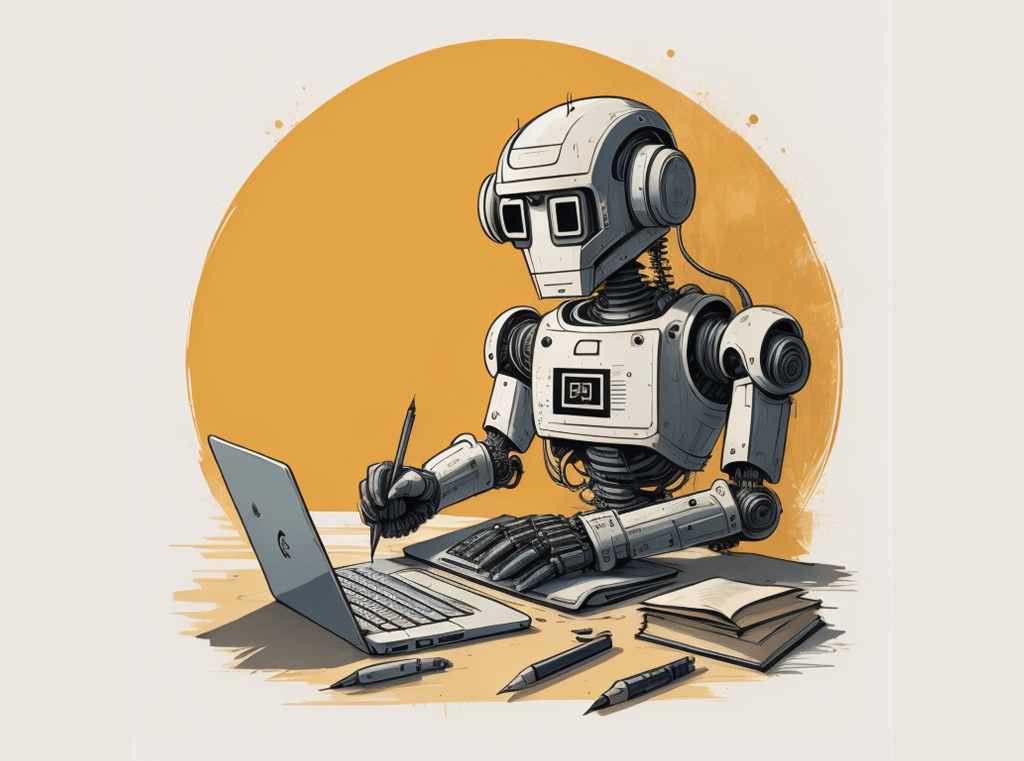My experience with AI writers
I’ve been testing out AI writers since 2020.
Back then, AI advocates everywhere were constantly baiting writers — telling us how AI was going to “put us out of work” and asking us “are you scared yet?”
They always say you should know your enemy, so that’s exactly what I set out to do.
I can separate my experiences with AI writers into two distinct time periods: Before ChatGPT and After ChatGPT.
Before ChatGPT
I tried a number of AI writers before ChatGPT came along and, to summarise my experiences, I wasn’t impressed. In every case, the AI had been oversold. It didn’t do what they said it would and — sorry, not sorry — you’re about to see a lot of air quotes.
The ‘research’, if you could call it that, was highly questionable. In many cases, I couldn’t find where the information had come from and had to conclude that AI had made it up.
The ‘writing’ was clunky, repetitive, and horrible to read. Some of it didn’t even make any sense.
And due to the scant prompts and commands I was able to give, the AI was ‘writing’ without an objective. In other words, it didn’t understand why it was writing what I’d asked it to write, so there was no strategy behind it.
Now, I know AI is only supposed to assist the writing process, but it would have taken me longer to fact-check and salvage what it had ‘written’ than it would have taken to research and write it from scratch.
In conclusion, I couldn’t see a reason why I would use it. There wasn’t any benefit to me.
After ChatGPT
Compared to those AI ‘writers’ I tested, ChatGPT is a completely different animal. And I’m told the latest version of ChatGPT is far more and advanced and superior than the free version everyone knows. So the technology is evolving and it can do much, much more.
However, it still has its limitations. There are things it doesn’t do well and areas where it really can’t be trusted. So, if you’re considering working with a human content writer, it’s only natural to have concerns about AI, whether a writer is using it in their content-writing process, and, if so, what controls they have in place.
With this in mind, I want to be transparent about my stance on AI and how I’m using it or may use it in future.
From this point, when I talk about AI, I’ll be referring to the free version of Chat GPT, because if I use any AI at all in my process, it will be this one.
The limitations of AI
For all its advances, AI still has limited capabilities in certain areas.
AI needs a lot of guidance
Like any computer program, AI needs to be told what to do.
It has the basic skills, but to get something more than just its basic output, it needs prompts. And finding the right prompts is a challenge in itself. Even after a lot of trial and error, it can still be way off the mark.
AI is bad at research
Exceptional content relies on exceptional research — and that research takes time. In most cases, it takes more time than actually writing the content.
I can spend hours going down rabbit holes — looking for credible, up-to-date information and tracking down the original sources.
I only wish AI could do that for me, but it can’t. At least, not for now.
AI can’t distinguish a quality source from a questionable one. It doesn’t look for the most up-to-date sources and, in some cases, it will even make things up.
Anything AI ‘researches’ needs to be thoroughly fact-checked. And anything it has ‘written’, using flawed information it has ‘researched’, will also be wrong.
AI can’t write about current events
ChatGPT is trained using a large dataset of text and only has access to information within that dataset. As the dataset only goes up to to a certain date, it can’t discuss events or information beyond that.
What? But doesn’t it just pull its information from the internet?
Err… no, apparently not. Although it’s capable of searching and processing information from the web, the free version is restricted to the information in its training dataset.
AI won’t help with SEO
The free version of ChatGPT doesn’t have access to the latest SEO data, so it can’t research or recommend high-performing keywords for you.
AI won’t sound like you
If you want your brand to be distinctive and recognisable, you’ll know that the way it looks and sounds is important.
But while a human writer can establish and replicate your brand’s tone of voice fairly easily, AI will struggle.
Huh? But hasn’t it mimicked the style of everyone from William Shakespeare to Jay-Z?
Well, yes, it has. But I’m guessing those works were part of its original data set, whereas your website and online materials aren’t so likely to be on its radar.
AI is devoid of humanness
When it first emerged, people applauded AI for how human it sounded. But it soon became clear that what really impressed them was its ability to string a vaguely coherent sentence together without sounding too robotic.
Wow. Amazing. 🙄
Except, when you’ve been using for a while, you realise it actually does sound robotic — to the point where you even start to recognise it out in the wild. It may be learning and evolving, but AI still has the modus operandi of a robot. Because it is a robot, following a preset set of instructions.
It will never have a human experience. It may never form an opinion of its own. It will never create something original or unique because its ‘work’ will always be regurgitated and bastardised from content that already exists.
My approach to AI
I’m cynical after my earlier adventures with AI. I’ve learned not to expect too much and to take everything I’m told with a sizeable pinch of salt.
And I don’t trust it. Not even a smidge. So I won’t be relying on it for anything.
Having said that, AI does have its uses.
I will be using AI for:
1. Inspiring blog post ideas
I used AI to generate a list of blog post ideas for my own business. They weren’t very inspiring and, out of 20, I’ve only used two, but it worked well as a springboard for thinking up better ideas of my own.
I will use it again for blog post ideas, but mainly for inspiring my own ideas.
2. Generating lists
I’ve found AI useful for coming up with lists of things. And I’ve used it at the very end of my content writing process, to double check there was nothing obvious I’d missed.
Using AI to create a list post would be lazy and it wouldn’t challenge me to think up original material. But I may use it as a checklist at the end of the process, to make sure the content I’ve written is comprehensive.
3. Deciphering client copy
Occasionally, clients ask me to edit copy or content they’ve written. But sometimes their terminology and sentence structure is overly complex and may not be totally clear.
I’ve used AI to translate copy like this into plain English. And though its interpretation of the copy wasn’t correct, it did make me read it differently, so I could understand what it was trying to say and rephrase it.
I may use it again to help me make sense of client copy, but not for the editing or rewriting itself.
4. SEO comparison
I’m still doing SEO the way I always have, with a keyword research tool and a bucketload of skills and experience.
But if a blog post needs to rank for competitive keywords, I’ll use AI to compare what I’ve written against the competition — and I may tweak my SEO so it competes more effectively.
This isn’t an automated process. It’s something I’ll do myself using the data AI provides.
I won’t be using AI for:
1. Any kind of research
AI has been found to make things up — and that alone tells me it’s not to be trusted.
Anything I write for you will be researched and verified by me, the old-fashioned way.
2. Any kind of writing
I’ve been a copywriter for almost 20 years. I enjoy writing and have developed an effective process that works well for me.
By contrast, I find AI incredibly tedious and frustrating. It can’t do a better job than I can and involving it in my writing process isn’t going to save me any time.
In other words, I don’t see the value in wasting time prompting a machine to do my job, when… I could just be doing my job.
Anything I write for you, or for myself, will be written by me.
3. Copy-editing
As I’ve proved in my own experiments, AI isn’t too sophisticated when it comes to reading and understanding what others have written. So there’s no way I would trust it to copy-edit my own work — or yours.
If I do use it in the editing process, it will be under my supervision and it won’t be making any final decisions.
4. Social media posts
Currently, I don’t write social media posts for anyone except myself — and I don’t expect that to change. But I won’t be using AI to write my posts.
About the author
I’m Jenny Lucas, a freelance copywriter and content writer based in Leicester, UK.
I’ve been working as a copywriter for almost 20 years.
I’m Gen-X, which means I grew up without the internet. I’m not a technophobe by any means, but I’m more interested in people than technology and I value the human experience.


You might also like…


11 Good reasons to hire me as your copywriter >>


AI copywriting risks: 19 Reasons NOT to rely on AI writers >>


How a copywriter can support you if you want to do the writing yourself >>
